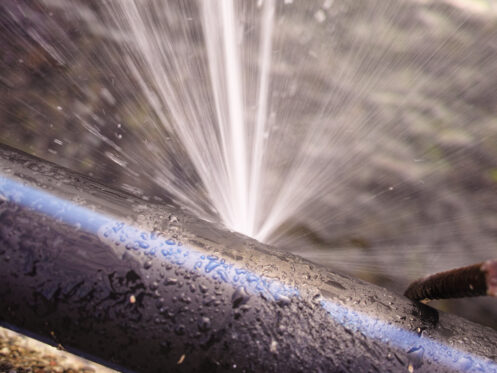If you’re committed to curbing your environmental impact, the best place to start could be your plumbing system. Outdated plumbing takes a serious toll on local water supplies and soils. It also poses a major threat to humans, animals, and many plant and insect species. Read on to discover several reasons to update the plumbing in your Washington, MO home.
Cracked Sewer Lines
All of the drains in your home converge onto a single sewer line. This line travels underground from your home to the municipal sewer main where it deposits all of your wastewater and solid waste. In general, residential sewer lines should last at least 60 years. However, older homes with sewer lines made from hardened clay or terracotta should have these pipes replaced after just 50 years. The use of hardened clay for sewer lines was discontinued in the late 1970s. Thus, now is the perfect time for homeowners with terracotta pipes to schedule upgrades.
Hardened clay is highly permeable. This makes clay sewer pipes more likely to be encroached upon by aggressive weeds and tree roots. As these things enter sewer pipes via tiny cracks and other structural imperfections, they create and widen leaks. This allows raw sewage to seep into the surrounding soils.
Over time, even newer ABS and PVC sewer pipes become vulnerable to this encroachment. Tree roots and weeds constantly seek entrance to these structures as a way to access the nutrient-dense materials and moisture they contain. Once sewer lines are cracked, they can cause environmental problems such as erosion, soil contamination, and groundwater contamination. Their highly toxic contents include dangerous pathogens and many chemical contaminants.
Soil Contamination
Leaky sewer lines deposit bacteria, viruses, and protozoa into local soils. If left unchecked, your leaking sewer line can impact both the soil on your property and the soil on neighboring properties. If you or anyone else in your area has planted a garden, these pathogens can impact the safety of all resulting produce and could render it unfit for either human or animal consumption.
Soil contamination also affects local wildlife species and their natural habitats by bringing germs and chemical contaminants into their living areas. After all, not only does your sewer line transport solid waste and wastewater, but it’s also carrying all of the cleaners, solvents, and other chemicals that you use in your home.
Residues from laundry detergents, dishwashing liquids, and other household cleaners can block soil pores to prevent water absorption and deprive plants of nutrients that are necessary for their growth. Worse still, natural soil bacteria cannot break many of these contaminants down.
Soil contamination resulting from leaky sewer pipes causes a chain reaction. For every plant that can no longer thrive in the affected area, multiple insect and animal species can suffer. Soil contamination can disrupt local food chains and create imbalances in wildlife by eliminating natural predators.
Soil Erosion
Leaky sewer lines can also cause soil erosion. When fully saturated by sewer waste, the affected soils cannot absorb new water during extended periods of precipitation. This weakens the surrounding soil and causes it to wash away. As it does, it carries harmful pathogens and chemical contaminants with it.
How Old Sewer Lines Affect Stormwater Systems
If your aging pipes are leaking and have saturated the surrounding soils, excess runoff and soil erosion can also overwhelm your neighborhood’s stormwater system. This can lead to backups, overflows, and flooding that affects everyone in the community.
What to Do About Old Sewer Lines
If you live in an old, historic home, have your terracotta or clay sewer pipes replaced right away. If you have an ABS or PVC sewer pipe, you should have it inspected at least once annually for leaks, blockages, and potential encroachment. This gives plumbers the chance to intervene before aging sewer pipes spew their contents into the surrounding soils.
Leaky Water Supply Pipes
Carrying fresh, potable water into your home, your water supply pipe can cause environmental problems, too. If left unchecked, leaky water supply pipes cause soil saturation and erosion, and they may make affected areas more prone to adverse, unwanted growths like mildew, mold, and other fungi. Leaking pipes flood the natural habitats of many insects and animals. Moreover, if they’re left unchecked for long, they can waste hundreds or even thousands of gallons of water.
How Leaky Water Supply Pipes Affect You
If you have a leaky water supply pipe, your water bill is unnecessarily high. Unfortunately, wherever there’s a viable point of ingress, bacteria, protozoa, and other harmful pathogens can enter your home’s water supply and affect the potability and overall safety of the water that you drink, bathe in, and cook with. This could lead to problems like:
- Nausea, vomiting, and diarrhea
- Skin rashes and general skin irritation
- Scalp irritation and hair loss
- Headaches
- Fatigue
Leaky water supply pipes can also carry chemical contaminants into your home, especially if the surrounding soils have been contaminated by other sources. For instance, if an automotive fluid spill on your driveway has leeched into the soil in your yard, contaminants from this spill could enter your home’s water supply.
What to Do About Leaky Water Supply Pipes
Scheduling annual whole-house plumbing inspections is the best way to catch and correct leaky water supply pipes early on. You should also schedule an inspection if you notice any significant drop in water pressure or a sudden increase in your water bill that isn’t justified by recent changes in resident behaviors.
Aging Plumbing and Electricity Waste
Certain aspects of your plumbing system are reliant upon electricity. For instance, whether gas-fired or electric, all modern water heaters require electricity for startup. Staying on top of water heater maintenance and regularly replacing sacrificial anode rods and water heaters themselves is essential for limiting energy waste due to inefficiency. Although electricity is considered “clean” energy given that using it does not directly produce greenhouse gases (GHGs), GHGs are often produced during the production of electricity.
Old Pipes and Water and Ground Contamination
Your old pipes don’t have to leak to have a devastating impact on both the natural environment and you. As galvanized pipes age and break down, they often release lead from their zinc coatings. This can impact your indoor water supply and may lead to soil and groundwater contamination.
The Environmental Effects of Sewer Gases
Unfortunately, solid waste and wastewater aren’t the only things that old, leaky pipes release. If your sewer line is cracked, it will eventually fill the area with noxious sewer gases. Known for their pungent, rotten egg odor, these gases contain ammonia, methane, hydrogen sulfide, and carbon dioxide. They’re dangerous to breathe in for any extended period and can adversely impact the health of humans, insects, plants, and animals.
We help homeowners in Washington, MO protect themselves and the natural environment. We offer top-notch air conditioning, heating, plumbing, and indoor air quality (IAQ) services. Our clients can also count on us for expert leak detection, drain cleaning, and water heater services. To learn more about updating your old plumbing system or request a hassle-free quote, get in touch with Level 9 Heating, Cooling, and Plumbing now.



